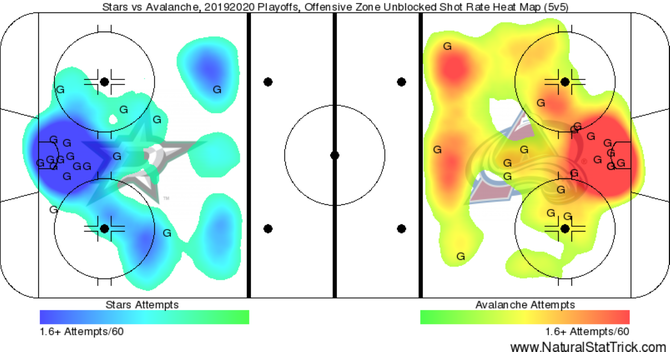
The Colorado Avalanche's bubble has been popped.
The Avs entered the postseason as a Western Conference contender on the rise, but ultimately their 2020 playoff run ended in the same place their 2019 run did -- in Game 7 of the second round. After falling into a 3-1 hole and then winning two straight to force Game 7 against the Dallas Stars, the Avalanche watched their season come to a sudden and heartbreaking conclusion when the Stars found an OT winner to claim the series victory.
So, where did things go wrong for the Avalanche? Let's try to break it down.
Injuries
Every playoff team making a serious push for the Stanley Cup will encounter unfortunate injuries and need to adjust on the fly -- that's just part of the deal. But every year there seems to be a team or two hit harder than others and this year one of those teams was the Colorado Avalanche.
Throughout the course of this seven-game series, Colorado went without Matt Calvert, Joonas Donskoi, Pavel Francouz, Philipp Grubauer, Erik Johnson and Gabriel Landeskog. That list includes several key players, including their starting and backup goaltender -- not usually a great sign. The loss of Grubauer early in Game 1 really seemed to disrupt the Avs from the jump and Francouz was rough in relief, which is a big reason Colorado fell into a significant hole that they had to dig themselves out of. The goaltending situation didn't really stabilize until Game 5 when Michael Hutchinson, of all people, came up big.
Then, Colorado losing its captain and a top forward in Landeskog ahead of Game 7 was a brutal blow. The Avs put up a valiant fight and still had a great opportunity to advance even with a depleted lineup, but the key absences certainly didn't do them any favors in this series.
Special teams
From a statistical perspective, there wasn't a whole lot separating the Avs and Stars. One of the bigger discrepancies, though, came via special teams. The Stars aren't typically an offensive juggernaut, but they do have an effective power play unit that finished fifth-best in the league during the regular season. Colorado's penalty killing unit failed to limit the damage in this series and it hurt them.
Dallas scored nine power play goals over 23 opportunities, giving Colorado's PK unit a miserable 60.8 percent kill rate over the seven games. That number looks even worse when you consider some of the spots in which Colorado gave up power play goals. In Game 2, the Avs jumped out to an early 2-0 lead and then gave Dallas a 5-on-3 opportunity and the Stars scored two power play goals to erase that early Colorado momentum. In Game 4, the Avs almost climbed out of a three-goal deficit but gave up a third period PPG that served as a dagger to that push.
On the other side, the Avs power play got plenty of opportunities but was not nearly good enough. Colorado went 4-for-32 in the series -- a lowly 12.5 percent conversion rate.
Defensive lapses -- especially in front of the net
If you had told me that 57 goals were going to be scored over the course of this series, I certainly would not have predicted that it would be the Stars moving on. Dallas is typically a defensive-minded team that grinds out victories while the Avalanche and their high-octane style of play tends to make them more of a track meet team. But Dallas did manage to find a good amount of offense in this series -- scoring five goals in each of their four victories -- and a lot of that production was born through the power play and/or their ability to win battles in front of the net.
The Stars play a heavy and physical brand of hockey that often isn't super pretty but can bring results. It sounds super cliche but they win battles down low and along the boards, they create traffic in front and put pucks on net. That was a recipe for success against the Avalanche, as Colorado often failed to protect that area. The Stars found a lot of success via deflections, screens and gritty second-chance conversions in close.
Here's a look at the goals map at 5v5 in the series, courtesy of Natural Stat Trick:

MacKinnon muzzled in Game 7
This was very much a series of stars being called on to show up for their respective team and, heading into a do-or-die Game 7, no single person in the series had done more for their club than Nathan MacKinnon. The Colorado center had 12 points through the first six games and carried a 14-game playoff point streak into the finale. Unfortunately for the Avalanche, he finally got blanked at a really unfortunate time.
That's certainly not to say that any of this is MacKinnon's fault (a laughable thought) or that he played super poorly in the finale (he didn't), but he was held off the scoreboard in the one game where it mattered most ... and that's always going to hurt a team that relies on MacKinnon as much as Colorado does.
Remember, this is the same MacKinnon who finished with more than double the point production of nearly every other player on the Avalanche roster this regular season. They need him to get on the point sheet almost every single night, especially when production from the bottom six is as unreliable as it was in this series.
The magic of... Joel Kiviranta?
Sometimes this sport is just weird and you can't really explain it. Heading into Game 7, Dallas' Joel Kiviranta had 11 games of NHL experience and just one goal. Thanks to an injury to Andrew Cogliano, Kiviranta was inserted into the Game 7 lineup and he proceeded to record a hat trick in his second career meaningful playoff game -- including the game-tying and game-winning goals.
Can't say I saw that one coming.






















